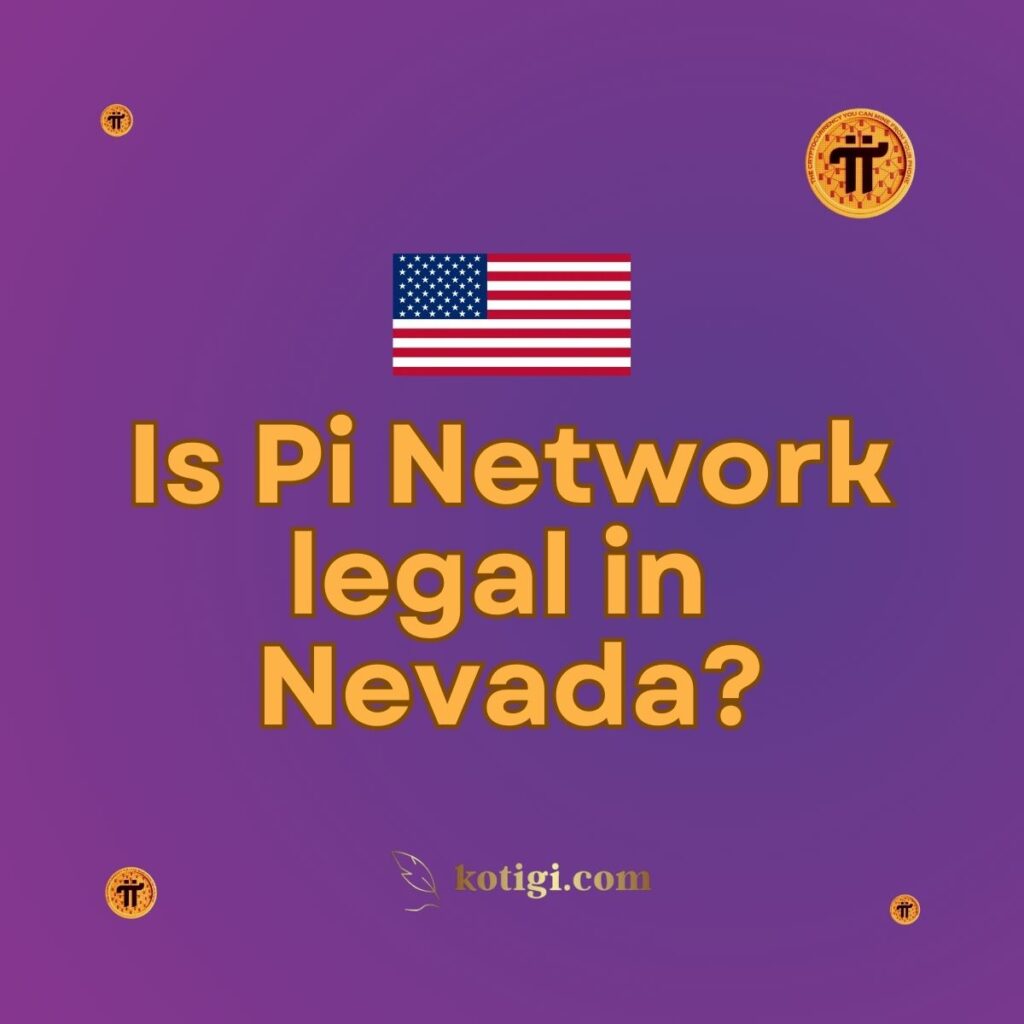
Is Pi Network legal in Nevada?
Yes, Pi Network is legal in Nevada. The state’s progressive blockchain and cryptocurrency laws, combined with its lack of a state income tax, provide a conducive environment for Pi Network users. However, users must still comply with federal cryptocurrency regulations, particularly around taxation and financial transparency.
Introduction
The rise of blockchain technology and cryptocurrencies has led to questions about their legal standing across different regions, especially in the United States. Pi Network, a new player in the crypto space, has attracted a vast community of users worldwide, including those in the U.S. Given Nevada’s history of embracing innovation and technology, the state offers a unique perspective on blockchain adoption.
In this post, we will examine whether Pi Network is legal in Nevada, taking a closer look at the state’s legal environment, its tax policies, security concerns, and how federal cryptocurrency regulations affect Pi Network users. Understanding these dynamics will help both new and existing Pi users in Nevada navigate the legal landscape.
Cryptocurrency Regulations in Nevada
The Legal Status of Cryptocurrencies in Nevada
In 2017, Nevada made headlines by becoming one of the first U.S. states to pass blockchain-friendly legislation. Senate Bill 398 specifically bans local governments from taxing blockchain transactions or implementing restrictions on the use of blockchain technology. This means that, as a digital currency, Pi Network faces no state-level taxation or regulatory barriers. Nevada’s clear support for blockchain technology creates a favorable environment for Pi Network’s legality.
Pi Network’s Legal Standing
Pi Network is not specifically mentioned in any Nevada legislation, which is not unusual, given the general nature of cryptocurrency regulations. However, this doesn’t mean that Pi Network operates in a legal grey area. Like Bitcoin or Ethereum, Pi Network is treated under the broader category of blockchain-based digital assets, meaning that users can mine, hold, and transact Pi tokens without fear of violating state law.
Federal Legal Considerations
While Nevada’s blockchain laws are permissive, federal regulations are still applicable to Pi Network users. The Securities and Exchange Commission (SEC) has issued guidelines about the classification of digital assets, ensuring that certain tokens are regulated as securities. Fortunately, Pi Network has not yet been classified as a security by the SEC, meaning it operates without the stringent requirements imposed on securities-based cryptocurrencies.
Another important federal institution is the Financial Crimes Enforcement Network (FinCEN), which enforces anti-money laundering (AML) laws. Pi Network, being a decentralized digital currency, does not face immediate scrutiny under FinCEN’s current rules but must follow AML guidelines as it evolves. Users should be cautious in complying with any future federal requirements related to financial transparency and fraud prevention.
Nevada’s Blockchain-Friendly Stance
Why Nevada Embraces Blockchain?
Nevada has actively positioned itself as a leader in blockchain technology. Senate Bill 398 prevents local governments from imposing taxes or requiring licenses on blockchain use. The bill shows Nevada’s commitment to remaining a forward-thinking state, providing blockchain companies and users a clear legal framework. For Pi Network users, this legal environment offers assurance that their participation in the network is secure and backed by state law.
The Economic Incentives for Blockchain Adoption
Blockchain has enormous potential to streamline government operations and provide transparent, decentralized solutions. Nevada’s move to embrace blockchain has led to significant interest from businesses and innovators looking to establish operations in the state. With no state income tax, Nevada is an appealing place for crypto enthusiasts and businesses alike, including those involved with Pi Network.
Pi Network’s alignment with Nevada’s technological ambitions makes it a natural fit in this environment. The decentralized nature of the network could potentially play a role in shaping the future of blockchain integration in the state, especially as more sectors adopt decentralized finance (DeFi) and digital currencies.
Tax Implications for Pi Network Users in Nevada
Nevada’s Approach to Taxing Cryptocurrencies
Unlike many states, Nevada does not impose an income tax on its residents. This means that Pi Network users in Nevada benefit from a tax-free environment at the state level. Mining rewards, transaction gains, and other forms of cryptocurrency-related income are not taxed by Nevada, making it an attractive state for Pi Network miners and users.
Federal Cryptocurrency Tax Laws
However, federal tax laws still apply. The IRS classifies cryptocurrency, including Pi, as property, meaning any earnings from mining, sales, or transactions are taxable under capital gains rules. Pi Network users must report their mining rewards and the value of any tokens sold or exchanged. Failure to do so could result in penalties from the IRS.
The taxation of Pi Network earnings hinges on the concept of “fair market value.” Since Pi tokens are not yet freely traded on exchanges, users must determine their tax liability based on a reasonable estimate of the token’s value when calculating capital gains. This can be challenging for Pi Network users, as the lack of liquidity complicates value assessments.
Best Practices for Pi Network Users in Nevada
To ensure compliance with federal tax regulations, Pi Network users should maintain detailed records of their mining rewards and any subsequent transactions. The IRS has made it clear that cryptocurrency earnings are taxable, even if the tokens are not exchanged for traditional currency. For Nevada residents, this primarily means paying attention to their federal tax obligations, as the state will not impose additional taxes on their cryptocurrency holdings.
Privacy and Security Concerns for Pi Network Users
Data Privacy Regulations in Nevada
Nevada has adopted strong data privacy laws that benefit cryptocurrency users, including those on Pi Network. The state’s emphasis on protecting consumers’ personal data aligns with the privacy-conscious nature of blockchain technology. Pi Network, as a decentralized platform, already offers strong privacy protections, but Nevada’s legislation adds an extra layer of security.
Nevada’s Senate Bill 220 requires website operators to allow Nevada residents to opt-out of the sale of their personal information. For Pi Network users, this means any interaction with websites or apps that collect personal data must comply with these state-level privacy standards. While Pi Network itself doesn’t sell user data, users should be aware of their rights under Nevada law when interacting with third-party services.
Ensuring Security for Pi Network Users
Blockchain technology is inherently secure due to its decentralized nature, but individual Pi Network users must take steps to protect their assets. Safeguarding private keys, using two-factor authentication, and ensuring that only official Pi Network applications are used can help prevent unauthorized access or cyber-attacks.
Nevada’s supportive stance on blockchain extends to cybersecurity, with state initiatives aimed at promoting secure digital environments. By adhering to both Pi Network’s security protocols and state cybersecurity best practices, users can ensure that their assets remain safe.
How Nevada’s Regulatory Framework Affects Pi Network?
State-Level Regulatory Impact
Nevada’s pro-blockchain legislation offers a supportive legal framework for Pi Network users. Unlike other states that have implemented stricter regulations or taxes on blockchain activities, Nevada’s lack of an income tax and its permissive stance on blockchain adoption make it a cryptocurrency-friendly state. This environment reduces the legal risks for Pi Network users, who can confidently mine and use their Pi tokens.
Potential Challenges
While Nevada offers a favorable environment for Pi Network, the state’s laws are still subject to change. Cryptocurrency regulations, particularly at the federal level, are constantly evolving. Nevada’s future regulatory decisions may impact the operation of Pi Network within the state, particularly if there is a push to implement stricter rules surrounding cryptocurrency usage.
Pi Network users should stay informed about both state and federal regulatory developments to avoid any legal complications. Although Nevada is currently a safe space for blockchain innovation, future changes in laws or federal policies could affect the legality of certain activities within Pi Network.
Conclusion
Pi Network is fully legal in Nevada, with the state’s progressive blockchain legislation providing a favorable environment for its users. The absence of state income taxes makes Nevada an attractive place for cryptocurrency miners and holders, but users must still comply with federal tax regulations and data privacy laws. Nevada’s strong privacy protections, combined with its forward-thinking stance on blockchain, position the state as a leader in cryptocurrency adoption, benefitting Pi Network users in particular.
Key Takeaways
- Pi Network is legal in Nevada, with no state-level restrictions on mining or using the cryptocurrency.
- Nevada’s lack of an income tax makes it an appealing state for Pi Network users, though federal tax obligations still apply.
- Federal tax reporting requirements necessitate that users declare their Pi Network earnings to the IRS.
- Nevada’s strong data privacy laws align well with the decentralized, privacy-conscious nature of Pi Network.
- Security best practices, such as protecting private keys and using official Pi Network apps, are essential for Nevada residents.
- Nevada’s blockchain-friendly laws offer Pi Network users a supportive legal environment, though future regulatory changes should be monitored.





